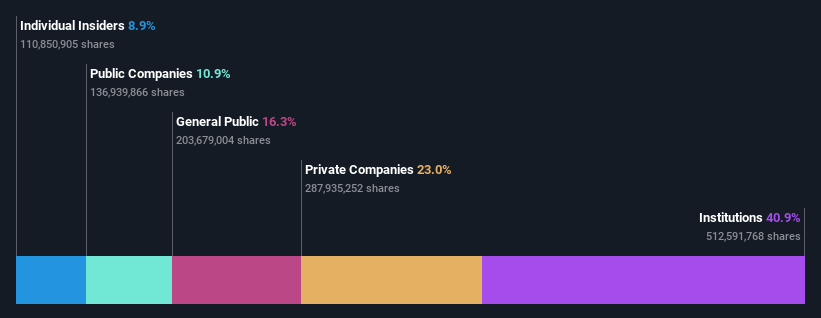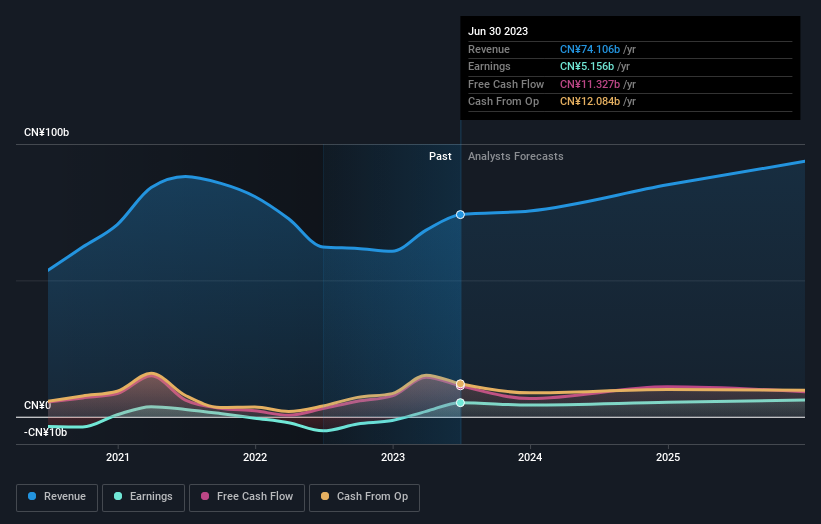- United States
- /
- Real Estate
- /
- NYSE:BEKE
KE Holdings Inc.'s (NYSE:BEKE) recent 3.8% pullback adds to one-year year losses, institutional owners may take drastic measures

Key Insights
- Significantly high institutional ownership implies KE Holdings' stock price is sensitive to their trading actions
- A total of 8 investors have a majority stake in the company with 50% ownership
- Ownership research along with analyst forecasts data help provide a good understanding of opportunities in a stock
If you want to know who really controls KE Holdings Inc. (NYSE:BEKE), then you'll have to look at the makeup of its share registry. With 41% stake, institutions possess the maximum shares in the company. That is, the group stands to benefit the most if the stock rises (or lose the most if there is a downturn).
As a result, institutional investors endured the highest losses last week after market cap fell by US$835m. The recent loss, which adds to a one-year loss of 7.2% for stockholders, may not sit well with this group of investors. Often called “market movers", institutions wield significant power in influencing the price dynamics of any stock. As a result, if the decline continues, institutional investors may be pressured to sell KE Holdings which might hurt individual investors.
Let's take a closer look to see what the different types of shareholders can tell us about KE Holdings.
Check out our latest analysis for KE Holdings

What Does The Institutional Ownership Tell Us About KE Holdings?
Institutions typically measure themselves against a benchmark when reporting to their own investors, so they often become more enthusiastic about a stock once it's included in a major index. We would expect most companies to have some institutions on the register, especially if they are growing.
As you can see, institutional investors have a fair amount of stake in KE Holdings. This suggests some credibility amongst professional investors. But we can't rely on that fact alone since institutions make bad investments sometimes, just like everyone does. It is not uncommon to see a big share price drop if two large institutional investors try to sell out of a stock at the same time. So it is worth checking the past earnings trajectory of KE Holdings, (below). Of course, keep in mind that there are other factors to consider, too.

We note that hedge funds don't have a meaningful investment in KE Holdings. Looking at our data, we can see that the largest shareholder is Z&Z Trust with 23% of shares outstanding. Meanwhile, the second and third largest shareholders, hold 11% and 4.8%, of the shares outstanding, respectively. Yongdong Peng, who is the third-largest shareholder, also happens to hold the title of Chairman of the Board.
On further inspection, we found that more than half the company's shares are owned by the top 8 shareholders, suggesting that the interests of the larger shareholders are balanced out to an extent by the smaller ones.
Researching institutional ownership is a good way to gauge and filter a stock's expected performance. The same can be achieved by studying analyst sentiments. There are a reasonable number of analysts covering the stock, so it might be useful to find out their aggregate view on the future.
Insider Ownership Of KE Holdings
While the precise definition of an insider can be subjective, almost everyone considers board members to be insiders. Company management run the business, but the CEO will answer to the board, even if he or she is a member of it.
I generally consider insider ownership to be a good thing. However, on some occasions it makes it more difficult for other shareholders to hold the board accountable for decisions.
We can see that insiders own shares in KE Holdings Inc.. It is a very large company, and board members collectively own US$1.7b worth of shares (at current prices). we sometimes take an interest in whether they have been buying or selling.
General Public Ownership
The general public-- including retail investors -- own 16% stake in the company, and hence can't easily be ignored. This size of ownership, while considerable, may not be enough to change company policy if the decision is not in sync with other large shareholders.
Private Company Ownership
We can see that Private Companies own 23%, of the shares on issue. It's hard to draw any conclusions from this fact alone, so its worth looking into who owns those private companies. Sometimes insiders or other related parties have an interest in shares in a public company through a separate private company.
Public Company Ownership
It appears to us that public companies own 11% of KE Holdings. It's hard to say for sure but this suggests they have entwined business interests. This might be a strategic stake, so it's worth watching this space for changes in ownership.
Next Steps:
I find it very interesting to look at who exactly owns a company. But to truly gain insight, we need to consider other information, too.
I like to dive deeper into how a company has performed in the past. You can access this interactive graph of past earnings, revenue and cash flow, for free.
If you are like me, you may want to think about whether this company will grow or shrink. Luckily, you can check this free report showing analyst forecasts for its future.
NB: Figures in this article are calculated using data from the last twelve months, which refer to the 12-month period ending on the last date of the month the financial statement is dated. This may not be consistent with full year annual report figures.
If you're looking to trade KE Holdings, open an account with the lowest-cost platform trusted by professionals, Interactive Brokers.
With clients in over 200 countries and territories, and access to 160 markets, IBKR lets you trade stocks, options, futures, forex, bonds and funds from a single integrated account.
Enjoy no hidden fees, no account minimums, and FX conversion rates as low as 0.03%, far better than what most brokers offer.
Sponsored ContentValuation is complex, but we're here to simplify it.
Discover if KE Holdings might be undervalued or overvalued with our detailed analysis, featuring fair value estimates, potential risks, dividends, insider trades, and its financial condition.
Access Free AnalysisHave feedback on this article? Concerned about the content? Get in touch with us directly. Alternatively, email editorial-team (at) simplywallst.com.
This article by Simply Wall St is general in nature. We provide commentary based on historical data and analyst forecasts only using an unbiased methodology and our articles are not intended to be financial advice. It does not constitute a recommendation to buy or sell any stock, and does not take account of your objectives, or your financial situation. We aim to bring you long-term focused analysis driven by fundamental data. Note that our analysis may not factor in the latest price-sensitive company announcements or qualitative material. Simply Wall St has no position in any stocks mentioned.
About NYSE:BEKE
KE Holdings
Through its subsidiaries, engages in operating an integrated online and offline platform for housing transactions and services in the People's Republic of China.
Flawless balance sheet and fair value.
Market Insights
Community Narratives



